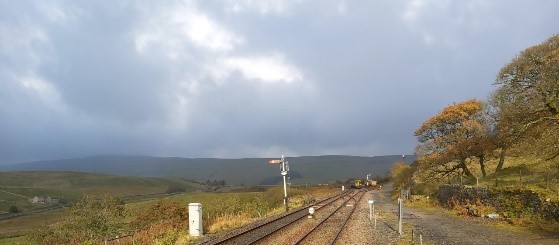28 October 2020
Signals at Danger
Railways in Reverse
by J.R. Thomas
 You read it here first. Spurs manager Jose Mourinho is leaving the Premier League club to take over Boris Johnson’s role as United Kingdom manager. Said Jose: “This is the New Normal. When I saw the boys taking over the running of the government, I knew they would need some direction from the centre.” He confirmed that Marcus Rashford, formerly of Manchester United, was already in post as Minister of Education and said “a good season for the lad and he’ll be Chancellor of the Excheqeur”. Mr Mourinho later confirmed that all his new cabinet ministers salaries were under review and added “ we think the easiest way is just to add a couple of noughts to what the previous lot were been paid”.
You read it here first. Spurs manager Jose Mourinho is leaving the Premier League club to take over Boris Johnson’s role as United Kingdom manager. Said Jose: “This is the New Normal. When I saw the boys taking over the running of the government, I knew they would need some direction from the centre.” He confirmed that Marcus Rashford, formerly of Manchester United, was already in post as Minister of Education and said “a good season for the lad and he’ll be Chancellor of the Excheqeur”. Mr Mourinho later confirmed that all his new cabinet ministers salaries were under review and added “ we think the easiest way is just to add a couple of noughts to what the previous lot were been paid”.
If anything underpins the image of a lost and confused adminstration on the run it is one that is outfooted at every turn by a 22 year old soccer player. There are various responses to being told that free school meals are the right of school children, but the wrong response is to say “Certainly not!” and then three days later to be looking for a way to do just that, with a present from Santa thrown in. This is, and in spite of the presence of Dominic Cummings and his group of powerful thinkers cerebrating behind the scenes, a government bereft of ideas, imagination, energy, and originality. It would always be that the final throes of Brexit would take up a large part of the Westminster intellectual output, but the impact of that meteor known as Covid19 has knocked the cabinet off its always slightly wobbly foundations.
Consider, for example, the UK railway system. Britain was not the birthplace of railway transport because of some brilliant insight by government, or some 25 year central plan to give the kingdom comprehensive coverage by freight and passenger services. It was private enterprise wot done it, the usual mix of opportunistic businessmen and greedy bankers that has over the years provided us with so many good things and material comforts. By 1845 – fifteen years after the first train on the Liverpool and Manchester Railway – the country had a good basic network, and in spite of several busts by over-exuberance , private enterprise always recovered itself and went on to provide a superb and comprehensive coverage of all of the UK. And profitable, we might add; except in a few outlying and remote districts this was all done with private capital.
After the First World War the government, having got used to the idea it was good at everything it touched, started to push the railways around, in this instance forcing regional mergers of the 120 odd railway companies into four (which did largely stay profitable). After another world war and another generation along came Mr Weknowbest of SW1 and took the whole system into public ownership. The world had changed and generally the multi-tentacled short run all services railway was not what the customer wanted. So the country endured fifty years of a slowly shrinking network, investment of public money into areas where it could not show a return, and failure to invest into those opportunitiess which would have been both popular and profitable. Plus lack of flexibility, bad service, dirty trains, and curly sandwiches.
Until finally, in the 1990’s, the Thatcher legacy was applied to the railways, both freight and passengers. Privatisation arrived at platform one. It is true that the structure imposed by civil servants, silently protesting at returning trains to private enterprise, was grossly complex, but nevertheless it gave the railways new heart. The number of passengers carried went from 750 million in 1995 to 1,750 million in 2019. There are more stations, more mileage of track, much newer trains, and significantly better standards of service. Like the airlines, most passengers can travel at significantly lower fares. The government is still putting public money into railways, but that is led by the private sector and so tends to produce returns and service where it is needed by railway customers. Not every railway company has survived but that is the nature of private enterprise; another has always sprung up to seize its opportunity.
But alas and alack, every little boy loves to play trains. When they stay in the attic doing that, no harm done. But when they are in the Ministry of Transport Office of Road and Rail they can become a menace, and a serious menace when they get their minister on side. In the MoT ORR are splendid executives and they know they know better than any railwayman or woman sitting in Truro or Newport or Burnley North how to run trains. And a lot of the time they cannot resist the temptation to lean over and tweak the controls. Alas and alack again, the structure devised by their predecessors allows them considerable tweaking ability, and it rarely helps any long term outcomes or emphasis on proper service by the true operators – those who run the trains.
Now, alas and alack thrice. Covid19 has lain heavily upon the track. You can quite correctly say that if the railways were truly independent private enterprises, they would all have gone, or be about to go, bust. No arguing with that; just like department stores, wine bars, restaurants and all the rest, the railways would not survive what is happening now without considerable government assistance. Well, they ain’t going to get it. Instead, with Grant Shapps as Minister of Transport – a truly buccanering Tory with his wealth from some energetic private enterprises – the whole passenger system is set to be renationalised (the freight business will remain in private hands) joining the track owner and manager Network Rail as government owned.
You may think from this express tour of railway history that the railways – and their users – do a lot better under private enterprise than when run from Whitehall. It may be that the Minister and his department are looking at early and imaginative ways to get the railways back into private hands to continue the successes of the last twenty five years. But somehow, there must be a supicion you are wrong. The railways are unlikely to be freed up, deregulated, and told to go out to compete on price and service. Big Spender Boris is indeed intent on building his very own trainset from London to Birmingham whatever the cost. He notably did not set free Transport for London’s captive passenger services during his mayoralty, indeed encouraging it to grow greater and greater.
Reprivatisation – done properly – would be an easy win for a Tory government wanting to reaffirm faith in enterprise and private risk. It would not have to look like before (indeed it would be much better to build something more akin to pre 1914 than the horse-as-camel privatisation devised in the 1990’s). But it would show that ideas and energy can still be forthcoming from a Conservative government, and it would have four years to prove itself.
We can’t (alas and alack) even rely on Jose Mourinho’s new team to sort this one out. Even supposing any of them ever use trains, word is we are about to see a mass resignation from Cabinet office. When Chancellor Harry Kane announced huge rises in income tax to pay for the Cabinet’s openhandedness, the whole team went into uproar. They hadn’t realised the connection between spending and taxing. Well, they do now.


